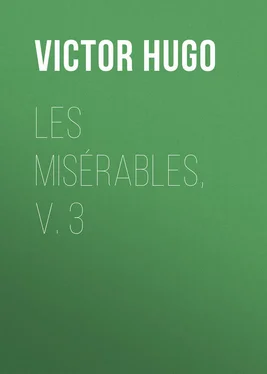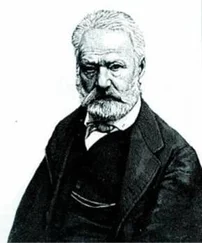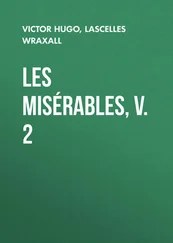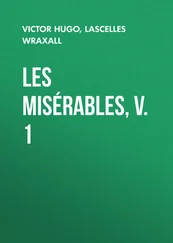Victor Hugo - Les Misérables, v. 3
Здесь есть возможность читать онлайн «Victor Hugo - Les Misérables, v. 3» — ознакомительный отрывок электронной книги совершенно бесплатно, а после прочтения отрывка купить полную версию. В некоторых случаях можно слушать аудио, скачать через торрент в формате fb2 и присутствует краткое содержание. Жанр: literature_19, foreign_antique, foreign_prose, на английском языке. Описание произведения, (предисловие) а так же отзывы посетителей доступны на портале библиотеки ЛибКат.
- Название:Les Misérables, v. 3
- Автор:
- Жанр:
- Год:неизвестен
- ISBN:нет данных
- Рейтинг книги:4 / 5. Голосов: 1
-
Избранное:Добавить в избранное
- Отзывы:
-
Ваша оценка:
- 80
- 1
- 2
- 3
- 4
- 5
Les Misérables, v. 3: краткое содержание, описание и аннотация
Предлагаем к чтению аннотацию, описание, краткое содержание или предисловие (зависит от того, что написал сам автор книги «Les Misérables, v. 3»). Если вы не нашли необходимую информацию о книге — напишите в комментариях, мы постараемся отыскать её.
Les Misérables, v. 3 — читать онлайн ознакомительный отрывок
Ниже представлен текст книги, разбитый по страницам. Система сохранения места последней прочитанной страницы, позволяет с удобством читать онлайн бесплатно книгу «Les Misérables, v. 3», без необходимости каждый раз заново искать на чём Вы остановились. Поставьте закладку, и сможете в любой момент перейти на страницу, на которой закончили чтение.
Интервал:
Закладка:
The author of these lines was for a long time a prowler about the suburbs of Paris, and it is a source of profound recollection for him. The worn grass, the stony path, the chalk, the marl, the plaster, the rough monotony of ploughed and fallow land, the young market-garden plants suddenly noticed in a hollow, the mixture of the wild and the tame, the vast deserted nooks in which the garrison drummers hold their noisy school, these Thebaïds by day and cut-throat dens by night, the tottering mill turning in the wind, the drawing-wheels of the quarries, the wine-shops at the corners of the cemeteries, the mysterious charm of the tall dark walls cutting at right angles immense open fields bathed in sunshine and full of butterflies, – all this attracted him.
Hardly any one knows those singular spots, – la Glacière, la Cimette, the hideous wall of Grenelle pock-marked with bullets, the Mont Parnasse, the Fosse aux Loups, the Tombe Issoire, or the Pierre Plate de Chatillon, where there is an old exhausted quarry, which is now only employed to grow mushrooms, and is closed by a heap of rotten boards flush with the ground. The Campagna of Rome is an idea, and the banlieue of Paris is another: to see in what an horizon offers us nought but fields, houses, or trees, is to remain on the surface; for all the aspects of things are the thoughts of God. The spot where a plain forms its junction with a town is always imprinted with a species of penetrating melancholy; for nature and humanity address you simultaneously, and local peculiarities make their appearance there.
Any one who has wandered as we have in those solitudes contiguous to our suburbs which might be called the Limbos of Paris has seen here and there, at the most deserted spot, and at the most unexpected moment, behind a scrubby hedge, or in the corner of some melancholy wall, children grouped tumultuously, fetid, muddy, dusty, unkempt, and ragged, playing together, wreathed with corn-flowers. They are the little runagates of poor families: this external boulevard is their breathing medium, and the banlieue belongs to them, and they eternally play truant in it. They ingenuously sing there their repertory of unclean songs. They are there, or, to speak more correctly, they dwell there, far from any eye, in the gentle warmth of May or June. Circling round a hole in the ground and snapping marbles, like irresponsible, freed, and happy beings, so soon as they perceive you they remember that they have a trade and must gain their livelihood, and they offer to sell you an old wool stocking full of may-bugs, or a spray of lilac. Such a meeting with chance children is one of the charming and yet poignant graces of the environs of Paris.
Sometimes there are girls among the heap of boys, – are they their sisters? – almost grown up, thin, feverish, sunburnt and freckled, crowned with wheat-ears and poppies, gay, haggard, and barefooted. You may see them eating cherries among the wheat, and at night hear them laugh. These groups, warmly illumined by the bright light of mid-day, or seen in the twilight, for a long time occupy the dreamer, and these visions are mingled with his dreams.
Paris is the centre, the banlieue is the circumference, – that is, the whole earth, for these children. They never venture beyond it, and can no more leave the Parisian atmosphere than fish can live out of water. With them there is nothing beyond two leagues from the barrière; Ivry, Gentilly, Arcueil, Belleville, Aubervilliers, Ménilmontant, Choisy le Roi, Bellancourt, Meudon, Issy, Vauvres, Sèvres, Puteaux, Neuilly, Gennevilliers, Colombes, Romainville, Chalon, Asnières, Bougival, Nanterre, Enghien, Noisy-le-sec, Nogent, Gournay, Drancy, and Gonesse, – at these places their universe ends.
CHAPTER VI
A BIT OF HISTORY
At the epoch almost contemporary with the action of this book there was not, as at the present day, a policeman at every street corner (a blessing which we have no time to discuss), and wandering children abounded in Paris. Statistics give us an average of two hundred and sixty shelterless children picked up annually by the police of that day in unenclosed fields, in houses building, and under the arches of bridges. One of these nests, which became famous, produced "the swallows of the Rue d'Arcole." This, by the way, is the most disastrous of social symptoms, for all the crimes of the man begin with the vagabondage of the lad.
We must except Paris, however, and in a relative degree, and in spite of the statistics we have just quoted, the exception is fair. While in any other great city a vagabond child is a ruined man, while nearly everywhere the boy left to himself is to some extent devoted and left to a species of fatal immersion in public vice, which destroys honor and conscience within him, the gamin of Paris, though externally so injured, is internally almost intact. It is a magnificent thing to be able to say, and one revealed in the splendid probity of our popular revolutions, that a certain incorruptibility emanates from the idea which is in the atmosphere of Paris, as from the salt which is in the ocean water. Breathing Paris preserves the soul.
But what we have just stated does not in any way decrease the heart-contraction which we feel every time we meet one of these lads, around whom we fancy that we can see the threads of the broken family fluttering. In our present civilization, which is still so incomplete, it is not a very abnormal fact that families thus broken up should not know what becomes of their children, and allow their own flesh and blood to fall upon the highway. Hence come these obscure destinies; and this sad thing has become proverbial, and is known as "being cast on the pavement of Paris."
Let us remark parenthetically that such desertion of children was not discouraged by the old monarchy. A little of the Bohemian and Egyptian element in the lower classes suited the higher spheres, and the powerful ones profited by it. Hatred of national education was a dogma; of what good were half-lights? Such was the sentence, and the vagabond boy is the corollary of the ignorant boy. Besides, the monarchy sometimes wanted lads, and then it skimmed the streets. In the reign of Louis XIV., to go no farther back, the King wished, rightly enough, to create a fleet. The idea was good; but let us look at the means. No fleet is possible unless you have by the side of the sailing-vessels, which are the plaything of the winds, vessels which can be sent wherever may be necessary, or be used as tugs, impelled by oars or steam; and in those days galleys were to the navy what steam-vessels now are. Hence galleys were needed; but galleys are only moved through the galley-slave, and hence the latter must be procured. Colbert ordered the Provincial intendants and parliaments to produce as many convicts as they could, and the magistrates displayed great complaisance in the matter. A man kept on his hat when a procession passed; that was a Huguenot attitude, and he was sent to the galleys. A boy was met in the street; provided that he was fifteen years of age and had no place to sleep in, he was sent to the galleys. It was a great reign, a great age.
In the reign of Louis XV. children disappeared in Paris; the police carried them off and no one knew for what mysterious employment. Monstrous conjectures were whispered as to the King's purple baths. It sometimes happened that when boys ran short, the exempts seized such as had parents, and the parents, in their despair, attacked the exempts. In such a case Parliament interfered and hanged – whom, the exempts? No, the fathers.
CHAPTER VII
THE GAMIN WOULD HAVE HIS PLACE IN INDIAN CASTES
The Parisian gamin almost forms a caste, and we might say that a boy does not become so by wishing. The word gamin was printed for the first time, and passed from the populace into literature, in 1834. It made its first appearance in a work called "Claude Gueux." The scandal was great, but the word has remained. The elements that constitute the consideration of gamins among one another are very varied. We knew and petted one, who was greatly respected and admired because he had seen a man fall off the towers of Notre Dame; another, because he had managed to enter the back-yard in which the statues of the dome of the Invalides were temporarily deposited, and steal lead off them; another, because he had seen a diligence upset; another, because he knew a soldier who had all but put out the eye of a civilian. This explains the exclamation of the Parisian gamin, at which the vulgar laughed without understanding its depth: "Dieu de Dieu! how unlucky I am! Just think that I never saw anybody fall from a fifth floor!" Assuredly it was a neat remark of the peasant's: "Father So-and-so, your wife has died of her illness: why did you not send for a doctor?" —
Читать дальшеИнтервал:
Закладка:
Похожие книги на «Les Misérables, v. 3»
Представляем Вашему вниманию похожие книги на «Les Misérables, v. 3» списком для выбора. Мы отобрали схожую по названию и смыслу литературу в надежде предоставить читателям больше вариантов отыскать новые, интересные, ещё непрочитанные произведения.
Обсуждение, отзывы о книге «Les Misérables, v. 3» и просто собственные мнения читателей. Оставьте ваши комментарии, напишите, что Вы думаете о произведении, его смысле или главных героях. Укажите что конкретно понравилось, а что нет, и почему Вы так считаете.












